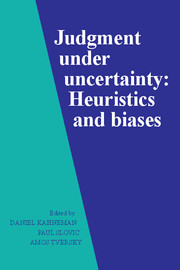Book contents
- Frontmatter
- Contents
- List of contributors
- Preface
- Part I Introduction
- Part II Representativeness
- Part III Causality and attribution
- 7 Popular induction: Information is not necessarily informative
- 8 Causal schemas in judgments under uncertainty
- 9 Shortcomings in the attribution process: On the origins and maintenance of erroneous social assessments
- 10 Evidential impact of base rates
- Part IV Availability
- Part V Covariation and control
- Part VI Overconfidence
- Part VII Multistage evaluation
- Part VIII Corrective procedures
- Part IX Risk perception
- Part X Postscript
- References
- Index
8 - Causal schemas in judgments under uncertainty
Published online by Cambridge University Press: 05 May 2013
- Frontmatter
- Contents
- List of contributors
- Preface
- Part I Introduction
- Part II Representativeness
- Part III Causality and attribution
- 7 Popular induction: Information is not necessarily informative
- 8 Causal schemas in judgments under uncertainty
- 9 Shortcomings in the attribution process: On the origins and maintenance of erroneous social assessments
- 10 Evidential impact of base rates
- Part IV Availability
- Part V Covariation and control
- Part VI Overconfidence
- Part VII Multistage evaluation
- Part VIII Corrective procedures
- Part IX Risk perception
- Part X Postscript
- References
- Index
Summary
Many of the decisions we make, in trivial as well as in crucial matters, depend on the apparent likelihood of events such as the keeping of a promise, the success of an enterprise, or the response to an action. Since we generally do not have adequate formal models to compute the probabilities of such events, their assessment is necessarily subjective and intuitive. The manner in which people evaluate evidence to assess probabilities has aroused much research interest in recent years, e.g., W. Edwards (1968, 25); Kahneman and Tversky (1979a, 30); Slovic (1972a); Slovic, Fischhoff, and Lichtenstein (1977); Tversky and Kahneman (1974, 1). This research has identified several judgmental heuristics which are associated with characteristic errors and biases. The present paper is concerned with the role of causal reasoning in judgments under uncertainty and with some biases that are associated with this mode of thinking.
It is a psychological commonplace that people strive to achieve a coherent interpretation of the events that surround them, and that the organization of events by schemas of cause-effect relations serves to achieve this goal. The classic work of Michotte (1963) provided a compelling demonstration of the irresistible tendency to perceive sequences of events in terms of causal relations, even when the perceiver is fully aware that the relation between the events is incidental and that the imputed causality is illusory.
- Type
- Chapter
- Information
- Judgment under UncertaintyHeuristics and Biases, pp. 117 - 128Publisher: Cambridge University PressPrint publication year: 1982
- 72
- Cited by

